Preface
Goal: Examine Package Manager, Focus on Command Line Interface
Using Debian minimal install in Docker, is a good way to learn The Advance Package Tool. APT is considered a basic knowledge utilized by Debian’s derived distribution such as Ubuntu, Mint, Elementary, Zorin, Kali Linux, Parrot, Cyborg, and some other cool Distribution.
We only need Stretch stable release.
We will switch to testing later on part three,
so that we have a chance to play more with package cycle.
Test Bed
-
Container: Docker
-
Operating System: Artix (OpenRC )
-
Window Manager: Herbstluftwm
Since we are going to use docker again, you can read a common overview here.
Of course you can use virtualization, the issue is distraction. We need to avoid tendency to focus on GUI tools. At the same time, limiting the scope to CLI tools. Most of the time, CLI tools is considered lower level than the GUI one.
Must Read
You are encouraged to read this first, before even starting to read this article.
There are already so many references for this APT. This is just another reference. I think that I’m late. I should have write these ten years ago.
Getting Started With Docker
As usual, first, we do attach docker process.
$ docker pull debian:stretch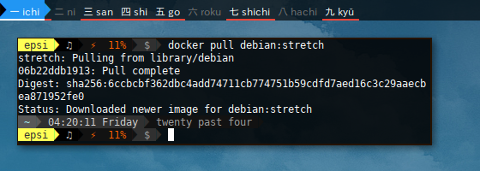
$ docker image list
--filter "reference=debian:*"
--format 'table {{.Repository}}\t{{.Size}}'
REPOSITORY SIZE
debian 100MBBy the container image size, Debian is good at managing minimal install.
$ docker run -it debian:stretch
root@f77ea94688d1:/# exit
exit
$ docker ps
--format 'table {{.Image}}\t{{.Names}}\t{{.Status}}'
IMAGE NAMES STATUS
debian:stretch goofy_allen Up 7 minutes
$ docker start goofy_allen
goofy_allen$ docker attach goofy_allen
root@f77ea94688d1:/# 
Package Management
Debian utilize APT, The Advanced Package Tool.
APT has a lower level tool caled dpkg
that handle .deb package files.
It has many front end,
DPKG Frontend
Last updated Eight Years Ago.
APT Frontend
-
APT (apt-get and family): Python:
-
apt-src: No github yet
-
aptitude: No github yet
- https://anonscm.debian.org/git/aptitude/aptitude.git
Get Help
Read the fine manual.
$ apt helpNote that with minimal install in docker,
we do not have man-db and less yet.
$ man aptThe new APT
I have been a Debian user since 2007. It means a decade. My hand automatically type every few days.
$ apt-get update
$ apt-get upgrade
$ apt-get autoremove
$ apt-get autocleanWhenever there is a conflict,
I use aptitude
instead of apt-get.
But this is going to change.
Now we have apt
instead of apt-get.
apt is a combination of most common command from
apt-get and apt-cache.
Now you can see there are some front end.
Our focus now is apt.
APT Shell
There also APT shell, separated from the official APT that enable user to focus on the task of managing package.
$ aptsh
Generating and mapping caches...
Reading commands history...
apt sh > Note that with minimal install in docker,
we do not have aptsh.
I personally never use this aptsh.
Updating System
First Thing First
First thing to do is updating my system as usual.
-
OS Release
-
Update
-
List Upgradable
-
Upgrade
OS Release
$ cat /etc/os-release
PRETTY_NAME="Debian GNU/Linux 9 (stretch)"
NAME="Debian GNU/Linux"
...Refresh Update
$ apt-get updateAlmost equal to:
$ apt update
Get:1 http://security.debian.org stretch/updates InRelease [62.9 kB]
Get:2 http://security.debian.org stretch/updates/main amd64 Packages [200 kB]
Ign:3 http://deb.debian.org/debian stretch InRelease
Get:4 http://deb.debian.org/debian stretch-updates InRelease [91.0 kB]
Get:5 http://deb.debian.org/debian stretch Release [118 kB]
Get:6 http://deb.debian.org/debian stretch-updates/main amd64 Packages [5553 B]
Get:7 http://deb.debian.org/debian stretch Release.gpg [2373 B]
Get:8 http://deb.debian.org/debian stretch/main amd64 Packages [9497 kB]
Fetched 9977 kB in 22s (444 kB/s)
Reading package lists... Done
Building dependency tree
Reading state information... Done
1 package can be upgraded. Run 'apt list --upgradable' to see it.Alternatively:
$ aptitude update
aptitude update
Ign http://deb.debian.org/debian stretch InRelease
Hit http://deb.debian.org/debian stretch-updates InRelease
Hit http://deb.debian.org/debian stretch Release
Hit http://security.debian.org stretch/updates InRelease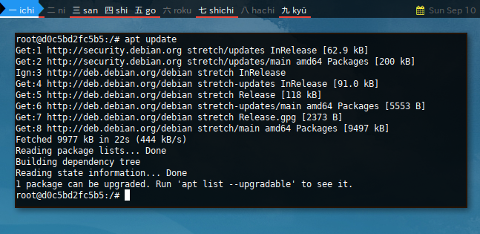
List Upgradable
just relax, folow what the command above, told us to do to list upgradable packages.
$ apt list --upgradable -a
Listing... Done
libgcrypt20/stable 1.7.6-2+deb9u2 amd64 [upgradable from: 1.7.6-2+deb9u1]
libgcrypt20/stable,now 1.7.6-2+deb9u1 amd64 [installed,upgradable to: 1.7.6-2+deb9u2]
Upgrade
$ apt-get upgradeAlmost equal to:
$ apt upgrade
Reading package lists... Done
Building dependency tree
Reading state information... Done
Calculating upgrade... Done
0 upgraded, 0 newly installed, 0 to remove and 0 not upgraded.Alternatively:
$ aptitude upgrade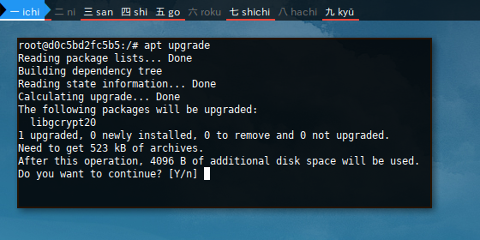
Full Upgrade
There is also this full-upgrade,
that resolve dependency conflict automatically.
$ apt-get full-upgradeAlmost equal to:
$ apt full-upgradeAlternatively:
$ aptitude full-upgradeThere is however.
$ aptitude safe-upgradeAnd later we will discuss
$ apt dist-upgradePackage IRSIF
Install, Remove, Search, Info, File
Package Install
Consider our favorite example package below. This will have a verbose long output.
$ apt-get install htop ncdu fish wget curl vim sudo aptitudeAlmost equal to:
$ apt install man-db nano less aptsh
Reading package lists... Done
Building dependency tree
Reading state information... Done
The following additional packages will be installed:
bsdmainutils groff-base libbsd0 libgdbm3 libgpm2 libncurses5
libpipeline1 libreadline5 readline-common
Suggested packages:
cpp wamerican | wordlist whois vacation groff gpm www-browser
spell readline-doc
The following NEW packages will be installed:
aptsh bsdmainutils groff-base less libbsd0 libgdbm3 libgpm2
libncurses5 libpipeline1 libreadline5 man-db nano
readline-common
0 upgraded, 13 newly installed, 0 to remove and 0 not upgraded.
Need to get 3511 kB of archives.
After this operation, 9857 kB of additional disk space will be used.
Do you want to continue? [Y/n]
...Alternatively:
$ aptitude install man-db nano less aptsh
man-db is already installed at the requested version (2.7.6.1-2)
nano is already installed at the requested version (2.7.4-1)
less is already installed at the requested version (481-2.1)
aptsh is already installed at the requested version (0.0.8)
man-db is already installed at the requested version (2.7.6.1-2)
nano is already installed at the requested version (2.7.4-1)
less is already installed at the requested version (481-2.1)
aptsh is already installed at the requested version (0.0.8)
No packages will be installed, upgraded, or removed.
0 packages upgraded, 0 newly installed, 0 to remove and 0 not upgraded.
Need to get 0 B of archives. After unpacking 0 B will be used.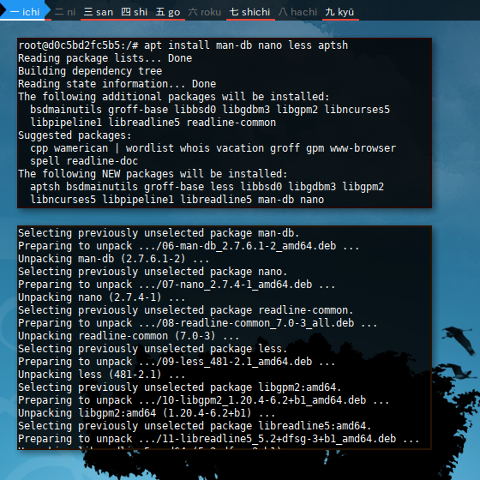
You can add -y to avoid confirmation.
This will assume yes for each confirmation.
$ apt-get install -y htop ncdu fish wget curl vim sudo aptitudeDownload
There are two ways to download package without installing.
$ apt-get install --download-only ncdu
...
Get:1 http://deb.debian.org/debian testing/main amd64 ncdu amd64 1.12-1+b1 [41.3 kB]
Fetched 41.3 kB in 1s (27.8 kB/s)
Download complete and in download only mode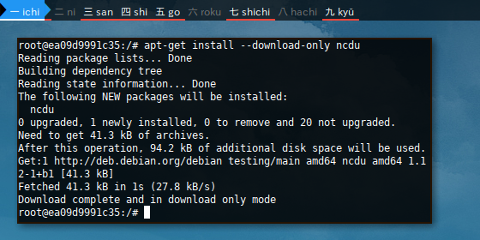
The package will be in cache.
$ ls /var/cache/apt/archives/
lock ncdu_1.12-1+b1_amd64.deb partial
The next time you do install, it does need to download anymore, because the package is alre4ady in the cache.
Alternatively you can bypass the cache.
$ cd ~$ apt-get download htop
Get:1 http://deb.debian.org/debian testing/main amd64 htop amd64 2.0.2-1 [88.2 kB]
Fetched 88.2 kB in 1s (69.2 kB/s)
W: Download is performed unsandboxed as root as file '/root/htop_2.0.2-1_amd64.deb' couldn't be accessed by user '_apt'. - pkgAcquire::Run (13: Permission denied)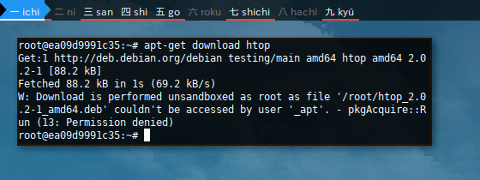
And you can install using low level dpkg later on.
$ dpkg -i htop_2.0.2-1_amd64.deb
Selecting previously unselected package htop.
(Reading database ... 36837 files and directories currently installed.)
Preparing to unpack htop_2.0.2-1_amd64.deb ...
Unpacking htop (2.0.2-1) ...
Setting up htop (2.0.2-1) ...
Processing triggers for mime-support (3.60) ...
Processing triggers for man-db (2.7.6.1-2) ...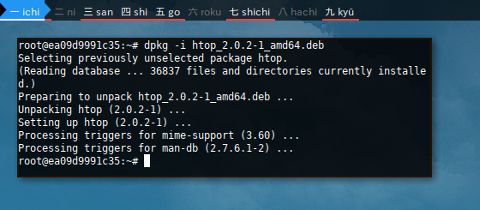
Package Removal
There are two kind of removal in APT.
It is apt remove and apt purge.
The last one also purge configuration.
Consider this groff-base,
that is dependency of man-db.
Debian is mature in managing dependency.
$ apt-get remove groff-baseAlmost equal to:
$ apt remove groff-base
Reading package lists... Done
Building dependency tree
Reading state information... Done
The following packages were automatically installed and are no longer required:
libgdbm3 libpipeline1
Use 'apt autoremove' to remove them.
The following packages will be REMOVED:
groff-base man-db
0 upgraded, 0 newly installed, 2 to remove and 0 not upgraded.
After this operation, 5624 kB disk space will be freed.
Do you want to continue? [Y/n] 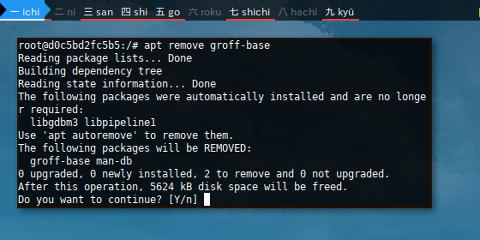
Alternatively, with aptitude use different approach:
$ aptitude remove groff-base
The following packages will be REMOVED:
groff-base
0 packages upgraded, 0 newly installed, 1 to remove and 0 not upgraded.
Need to get 0 B of archives. After unpacking 3339 kB will be freed.
The following packages have unmet dependencies:
man-db : Depends: groff-base (>= 1.18.1.1-15) but it is not going to be installed
The following actions will resolve these dependencies:
Remove the following packages:
1) man-db [2.7.6.1-2 (now, stable)]
Accept this solution? [Y/n/q/?]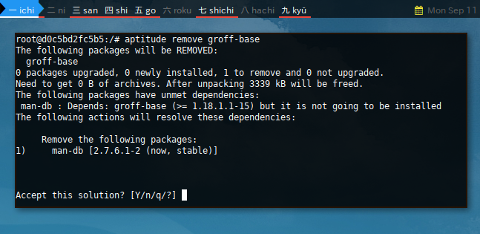
This different aptitude approach is,
why I use aptitude whenever I have package conflict.
Before the new apt comes out.
It is just an example. We do not realy need to delete it.
Package Query Search
Search used to be handled by apt-cache.
But the output is slightly different.
$ apt search ncdu
Sorting... Done
Full Text Search... Done
ncdu/stable 1.12-1+b1 amd64
ncurses disk usage viewer
$ apt-cache search ncdu
ncdu - ncurses disk usage viewerAlternatively:
$ aptitude search ncdu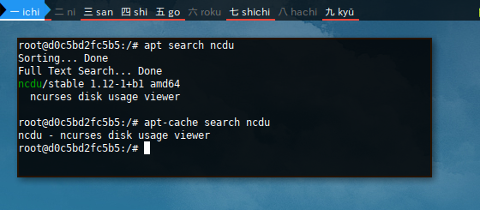
There are a lower level dpkg-query --list tool as well.
I must admit this is my favorite.
$ dpkg-query --list apt*
Desired=Unknown/Install/Remove/Purge/Hold
| Status=Not/Inst/Conf-files/Unpacked/halF-conf/Half-inst/trig-aWait/Trig-pend
|/ Err?=(none)/Reinst-required (Status,Err: uppercase=bad)
||/ Name Version Architecture Description
+++-===============-============-============-====================================
ii apt 1.4.7 amd64 commandline package manager
un apt-doc <none> <none> (no description available)
un apt-utils <none> <none> (no description available)
un apt-xapian-inde <none> <none> (no description available)
ii aptitude 0.8.7-1 amd64 terminal-based package manager
ii aptitude-common 0.8.7-1 all architecture independent files for t
un aptitude-doc <none> <none> (no description available)
un aptitude-doc-en <none> <none> (no description available)
ii aptsh 0.0.8 amd64 apt interactive shell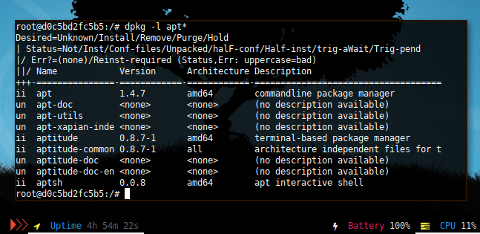
Package Show Info
Pretty straightforward.
$ apt-cache show ncduAlmost equal to:
$ apt show ncdu
Package: ncdu
Version: 1.12-1+b1
Priority: optional
Section: admin
Source: ncdu (1.12-1)
Maintainer: Eugene V. Lyubimkin <jackyf@debian.org>
Installed-Size: 94.2 kB
Depends: libc6 (>= 2.14), libncursesw5 (>= 6), libtinfo5 (>= 6)
Homepage: http://dev.yorhel.nl/ncdu/
Tag: admin::monitoring, implemented-in::c, interface::text-mode,
role::program, scope::utility, uitoolkit::ncurses
Download-Size: 41.3 kB
APT-Sources: http://deb.debian.org/debian stretch/main amd64 Packages
Description: ncurses disk usage viewerAlternatively:
$ aptitude show ncdu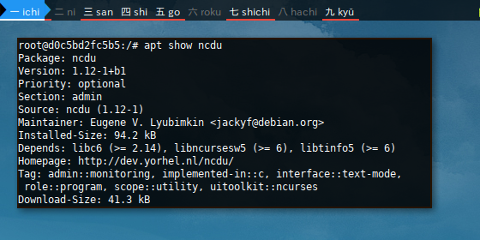
This show will grab all package with respected pattern.
You can narrow the result using regular expression.
$ apt search '^apt$'There are a lower level dpkg-query --status tool as well.
$ dpkg-query --status apt
Package: apt
Status: install ok installed
Priority: important
Section: admin
Installed-Size: 3538
Maintainer: APT Development Team <deity@lists.debian.org>
Architecture: amd64
Version: 1.4.7
Replaces: apt-utils (<< 1.3~exp2~)
Depends: adduser, gpgv | gpgv2 | gpgv1, debian-archive-keyring, init-system-helpers (>= 1.18~), libapt-pkg5.0 (>= 1.3~rc2), libc6 (>= 2.15), libgcc1 (>= 1:3.0), libstdc++6 (>= 5.2)
Recommends: gnupg | gnupg2 | gnupg1
Suggests: apt-doc, aptitude | synaptic | wajig, dpkg-dev (>= 1.17.2), powermgmt-base, python-apt
Breaks: apt-utils (<< 1.3~exp2~)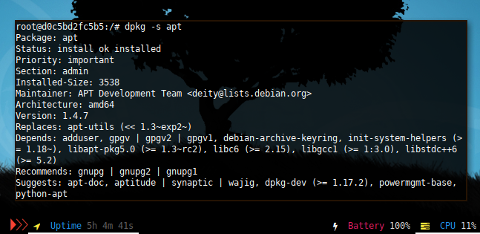
You may find dpkg -I useful to get information directly from the package.
$ dpkg-deb --info htop_2.0.2-1_amd64.deb
new debian package, version 2.0.
size 88164 bytes: control archive=856 bytes.
581 bytes, 17 lines control
564 bytes, 9 lines md5sums
Package: htop
Version: 2.0.2-1
Architecture: amd64
Maintainer: Daniel Lange <dl.ml1@usrlocal.de>
...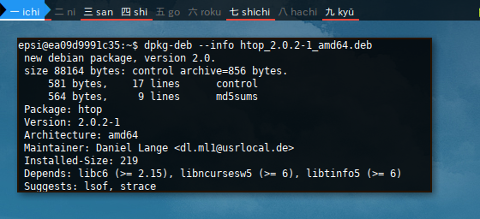
List Files
Listing package files can be achieved using dpkg.
$ dpkg -L ncduOr
$ dpkg-query --listfiles ncdu
/.
/usr
/usr/bin
/usr/bin/ncdu
/usr/share
/usr/share/doc
/usr/share/doc/ncdu
/usr/share/doc/ncdu/changelog.Debian.amd64.gz
/usr/share/doc/ncdu/changelog.Debian.gz
/usr/share/doc/ncdu/changelog.gz
/usr/share/doc/ncdu/copyright
/usr/share/man
/usr/share/man/man1
/usr/share/man/man1/ncdu.1.gz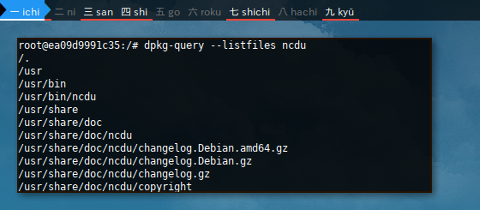
Extract
If you are a curious person, you can even extract the package.
$ dpkg-deb --extract htop_2.0.2-1_amd64.deb .What’s Next
APT is a mature package management, so many commands that this topic deserve its own long article. Consider finish reading [ Part Two ].
Thank you for reading